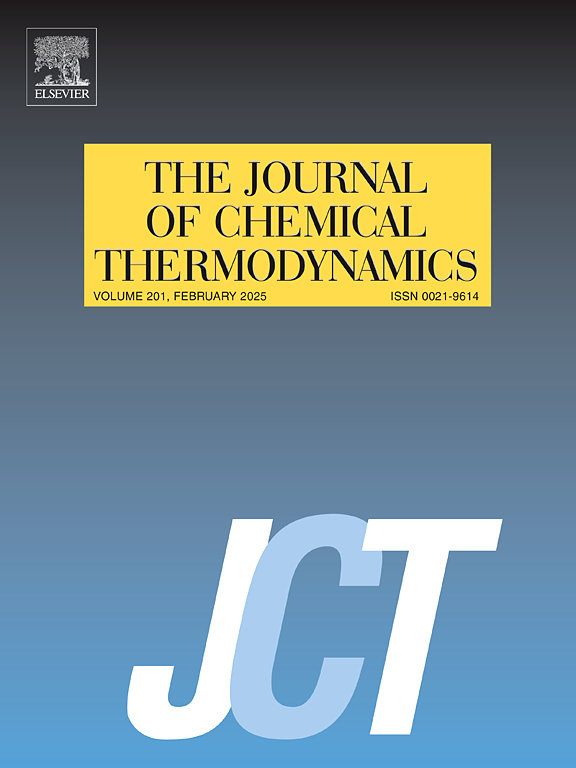VLE of binary mixtures of tri-substituted imidazolium ionic liquids with ethanol or water: Experimental and molecular-level insights
IF 2.2
3区 工程技术
Q3 CHEMISTRY, PHYSICAL
引用次数: 0
Abstract
This study investigates the vapor-liquid equilibrium behavior of binary mixtures comprising tri-substituted imidazolium ionic liquids with either ethanol or water, combining experimental analysis with molecular-level insights. The ionic liquids used in this research are 1-ethyl-2,3-dimethylimidazolium bromide ([C2MMIm][Br]) and 1-ethyl-2,3-dimethylimidazolium chloride ([C2MMIm][Cl]). The investigation focuses on the effects of temperature, the type of ionic liquid, and the amount of ionic liquid added on the vapor pressure of these binary systems. The experimental data are fitted using the NRTL, Electrolyte NRTL and Wilson models to determine the binary interaction parameters. Furthermore, this study evaluates the influence of different ionic liquids on the vapor pressure of the binary systems to assess the strength of intermolecular interactions between the ionic liquids and ethanol or water. Molecular-level analyses, including surface charge density, dipole moment, and excess enthalpy, are conducted using the COSMO-RS model to explore the interactions between the ionic liquids and solvents, thereby providing theoretical insights into the phase equilibrium behavior. These investigations offer fundamental data essential for the engineering design and large-scale application of ionic liquid extractive distillation processes.

三取代咪唑离子液体与乙醇或水二元混合物的VLE:实验和分子水平的见解
本研究结合实验分析和分子水平的见解,研究了由三取代咪唑离子液体与乙醇或水组成的二元混合物的汽液平衡行为。本研究使用的离子液体为1-乙基-2,3-二甲基咪唑溴([C2MMIm][Br])和1-乙基-2,3-二甲基咪唑氯([C2MMIm][Cl])。研究了温度、离子液体种类和离子液体加入量对二元体系蒸汽压的影响。采用NRTL、电解质NRTL和Wilson模型拟合实验数据,确定二元相互作用参数。此外,本研究还评估了不同离子液体对二元体系蒸汽压的影响,以评估离子液体与乙醇或水的分子间相互作用的强度。使用cosmos - rs模型进行分子水平分析,包括表面电荷密度、偶极矩和过量焓,以探索离子液体和溶剂之间的相互作用,从而为相平衡行为提供理论见解。这些研究为离子液体萃取精馏工艺的工程设计和大规模应用提供了必要的基础数据。
本文章由计算机程序翻译,如有差异,请以英文原文为准。
求助全文
约1分钟内获得全文
求助全文
来源期刊

Journal of Chemical Thermodynamics
工程技术-热力学
CiteScore
5.60
自引率
15.40%
发文量
199
审稿时长
79 days
期刊介绍:
The Journal of Chemical Thermodynamics exists primarily for dissemination of significant new knowledge in experimental equilibrium thermodynamics and transport properties of chemical systems. The defining attributes of The Journal are the quality and relevance of the papers published.
The Journal publishes work relating to gases, liquids, solids, polymers, mixtures, solutions and interfaces. Studies on systems with variability, such as biological or bio-based materials, gas hydrates, among others, will also be considered provided these are well characterized and reproducible where possible. Experimental methods should be described in sufficient detail to allow critical assessment of the accuracy claimed.
Authors are encouraged to provide physical or chemical interpretations of the results. Articles can contain modelling sections providing representations of data or molecular insights into the properties or transformations studied. Theoretical papers on chemical thermodynamics using molecular theory or modelling are also considered.
The Journal welcomes review articles in the field of chemical thermodynamics but prospective authors should first consult one of the Editors concerning the suitability of the proposed review.
Contributions of a routine nature or reporting on uncharacterised materials are not accepted.
 求助内容:
求助内容: 应助结果提醒方式:
应助结果提醒方式:


